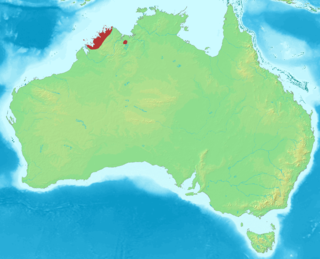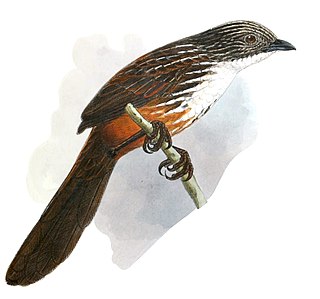
The beaded gecko is a gecko endemic to Australia.
The western beaked gecko is a species of gecko found throughout the interior of Australia.

Franz Steindachner was an Austrian zoologist, ichthyologist, and herpetologist. He published over 200 papers on fishes and over 50 papers on reptiles and amphibians Steindachner described hundreds of new species of fish and dozens of new amphibians and reptiles. At least seven species of reptile have been named after him.

Diplodactylinae is a subfamily in the family Diplodactylidae sensu lato. In some classifications, it is equivalent to family Diplodactylidae, which is in the infraorder Gekkota. There are 142 species in seventeen genera.

The Kimberley rock rat is a species of rodent in the family Muridae. It is found only in Australia, specifically in the northern tropical part of the Northern Territory and adjacent Kimberley region of Western Australia, in high-altitude closed forest.

The white-throated grasswren is a species of bird in the family Maluridae. It is endemic to Australia.

The Mary River flows in the Northern Territory of Australia and is a site of the Mary River National Park.

The Diplodactylidae are a family in the suborder Gekkota (geckos), with over 150 species in 25 genera. These geckos occur in Australia, New Zealand, and New Caledonia. Diplodactylids are the most ecologically diverse and widespread family of geckos in both Australia and New Caledonia, and are the only family of geckos found in New Zealand. Three diplodactylid genera have recently been split into multiple new genera

Lucasium steindachneri, commonly called the box-patterned gecko or Steindachner's gecko, is a species of nocturnal, medium-sized lizard in the family Diplodactylidae. The species has a pale strip with three patches of brown along its back. This gecko is terrestrial and only found in arid and semi-arid areas of continental Australia.
Lucasium byrnei, commonly known as the gibber gecko or Byrne's gecko, is a species of small, nocturnal gecko, a lizard in the family Diplodactylidae. The species is endemic to Australia.

Lucasium stenodactylum, also known as the crowned gecko or pale-snouted ground gecko, is a species of gecko from Australia.

Lucasium is a genus of lizards, sometimes called ground geckos, in the family Diplodactylidae. The genus is endemic to Australia, and it includes 14 species.
Lucasium bungabinna is a gecko endemic to Australia which is found in Western Australia and South Australia.
The pale-striped ground gecko is a gecko endemic to Australia.

Main's ground gecko is a species of gecko, a lizard in the family Diplodactylidae. The species is endemic to Australia.
The mottled ground gecko is a gecko endemic to Australia.

Pygopodoidea is a gecko superfamily and the only taxon in the gekkotan subclade Pygopodomorpha. The clade includes three Australasian families: Diplodactylidae, Carphodactylidae, and Pygopodidae. Traditional gekkotan systematics had considered Diplodactylidae and Carphodactylidae as subfamilies of the family Gekkonidae, but recent molecular work have placed Pygopodidae within Gekkonidae making it paraphyletic. These analyses have shown support of Pygopodidae and Carphodactylidae being sister taxa, with Diplodactylidae occupying a basal position in Pygopodoidea.
The Gilbert ground gecko is a gecko endemic to Australia.
Lucasium microplax is a gecko endemic to Australia which is found in Western Australia, Northern Territory, and South Australia.
There are two species of gecko named Pilbara ground gecko:









